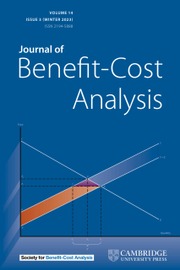Article contents
Challenges in applying the paradigm of welfare economics to climate change
Published online by Cambridge University Press: 27 May 2015
Abstract:
This paper discusses the challenges inherent in developing benefit-cost analysis (BCAs) of climate change. Challenges are explored from three perspectives: meeting the foundational premises for conducting BCA within the framework of welfare economics, methodological considerations that affect the application of the tools and techniques of BCA, and practical limitations that arise out of resource constraints and the nature of the question, project, or policy being evaluated. Although economic analysts frequently face – and overcome – conceptual and practical complications in developing BCAs, climate change presents difficulties beyond those posed by more conventional environmental problems. Five characteristics of the climate system and associated impacts on human and natural systems are identified that pose particular challenges to BCA of climate change, including ubiquity of impacts, intangibility, non-marginal changes, long timeframes, and uncertainty. These characteristics interact with traditional economic challenges, such as valuing non-market impact, addressing non-marginal changes, accounting for low-probability but high-impact events, and the eternal issue of appropriately discounting the future. A mapping between the characteristics of climate change and traditional economic challenges highlights the difficulties analysts are likely to encounter in conducting BCA. Despite these challenges, the paper argues that the fundamental ability of economic analysis to evaluate alternatives and tradeoffs is vital to decision making. Climate-related decisions span a wide range in terms of their scope, complexity, and depth, and for many applications of economic analyses the issues associated with climate change are tractable. In other cases it may require improved economic techniques or taking steps to ensure uncertainty is more fully addressed. Augmenting economic analysis with distribution analysis or an account of physical effects, and exploring how economic benefit and cost estimates can be incorporated into broader decision making frameworks have also been suggested. The paper concludes that there are opportunities for BCA to play a key role in informing climate change decision-making.
Information
- Type
- Research Article
- Information
- Journal of Benefit-Cost Analysis , Volume 5 , Issue 3: Special Issue: Perspectives on Implementing Benefit-Cost Analysis in Climate Assessment , December 2014 , pp. 347 - 376
- Copyright
- Copyright © Society for Benefit-Cost Analysis 2014
References
- 11
- Cited by

